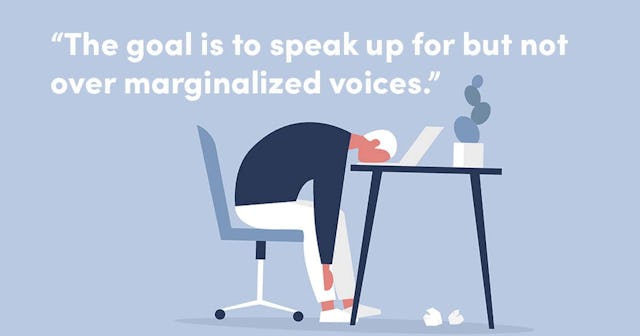We Need To Start Listening To LGBTQ Allies Who Aren't Famous

Allyship is a vital component in the battles that are fought for people who face discrimination. The goal is to speak up for but not over marginalized voices. Ideally allies are patient, check their biases and acknowledge their mistakes without defenses. They offer space for those of us in marginalized communities to rest while they do the emotional and educational labor of teaching the ignorant. In some ways allies are our wall of protection, and often times the only option we have if we want our messages to be heard.
This is especially true for those of us in the LGBTQIA+ community. There is both good fortune and a sense of unfortunate reality when allies are more palatable than those of us who live in the margins and shadows of fear. I have had to resign myself that sometimes progress needs to be made by those who support me but who don’t have the same rights or quality of life to gain or lose.
Yet, I know LGBTQIA+ allies do have something to lose. They have loved ones who could be lost to hate crimes, addiction, self-harm, and death by suicide. Allyship is personal in direct ways, even if an ally can’t fully appreciate what it is like to live a queer life. Make zero mistakes about my own appreciation for allies, especially the famous ones. I am grateful for people like Dwyane Wade, Charlize Theron, and Cynthia Nixon who use their influence and platforms to proudly announce their unconditional support and love for their gay or transgender child.
However, I also feel defeated and frustrated because headlines showing popular celebrities doing what all parents should do are celebrated more than a parent standing up at a PTO meeting begging their school to protect their transgender child from bullying.
I often say, “No one listens to me.” This is partly in jest because I am a parent and it really does feel like my kids never listen. But there is truth and frustration in this phrase too. As a queer person raising a transgender child, I have been defending myself, my family, and others in the LGBTQIA+ community for years. I can, and have, written until my fingers are numb and talked until my voice is gone about the importance of acceptance and affirmation. I can list statistics of abuse, mental health struggles, and harassment for those of us in the queer community. I can tell both sad and heartwarming stories, and show examples of why inclusivity is important and the dangers when it is not available. I can give folks actionable tasks to make spaces safer. I can use science and personal experience to prove that I and so many others are not choosing a “lifestyle” but are just choosing to live our truth.
fanjianhua/Getty
When famous people fill headlines and go on media tours to say the same thing that I and so many other parents and queer folks have been saying for years or lifetimes, I am grateful for the representation. But I am disgusted by people’s inability to listen unless they think the message is coming from someone who is seen as cool or trendy. Are these celebrities more relatable to you than any other parent? I would argue that everyday folks like me who don’t have the privilege of power and money are more relatable than international stars. Is our society so shallow that we value fame, and the idea that it could be lost by the person who supports transgender youth, that only then can we find value in marginalized voices? Because if they are willing to lose their fortune than there must really be something to this gay and transgender thing?
I and so many other queer folks have been delivering the same message as Dwayne Wade, Gabrielle Union, and other celebrity allies, but with mixed results. Perhaps it is the relatability of seeing straight, cisgender people like themselves that motivates people to listen. Perhaps it is seeing a dad, one who embodies athleticism and masculinity, that allows other dads to let their guards down. Perhaps it is seeing people of color embrace the intersectionality of race and queerness that helps people see the importance of protecting transgender women of color. Perhaps it is the bandwagon effect of doing what is right, even if it is because you want to be seen on the right side of popular.
I know it is because of all of those reasons. I don’t have the same influence as a celebrity or someone of high status. I have been in the trenches longer than most of them, though, and it’s painful to see them revered and their allyship celebrated and accepted with such ease. The message seems to be that support runs parallel with popularity. Listening to a queer stranger or a parent of a queer kid who you will never see in a headline is just as important—more so—as listening to the allies who make the news.
I am grateful for the allies who have the privilege to speak and be heard. I know progress can’t be made without them.
I am frustrated by the folks who will only listen to a noteworthy ally, however. Or any ally for that matter.
Conditional support is not allyship. Allies are simply amplifying our voices. We are the words, experiences, fears, needs, and victories that funnel through the megaphone from our lips to your ears. Remember to listen to the original source of the sound too.
This article was originally published on